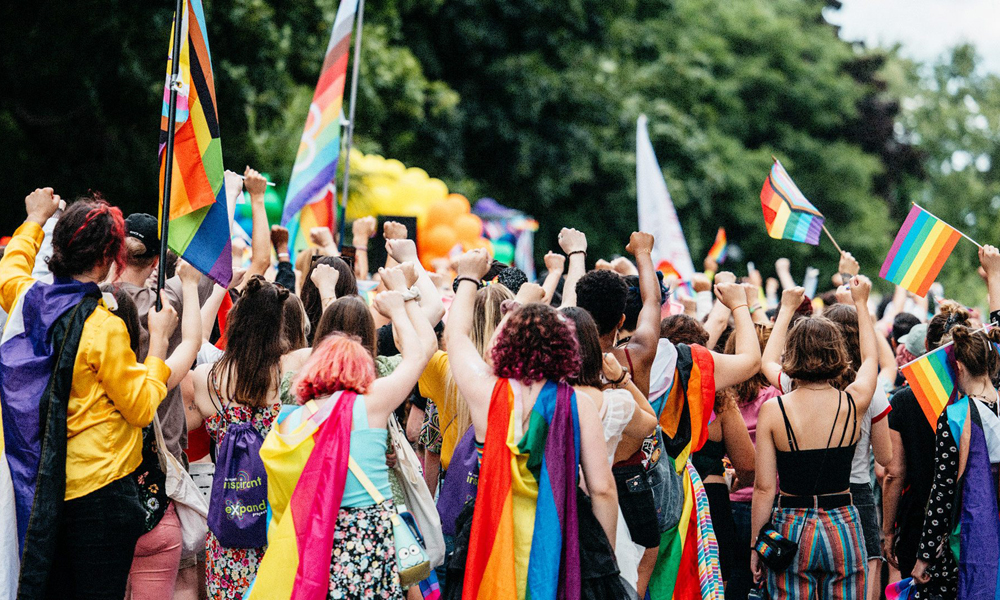Learn how to spot the signs – and what to do if you believe someone you know may be experiencing intimate partner violence…
By Jumol Royes
It’s time we had a real conversation about intimate partner violence in 2SLGBTQI+ communities.
I’ll admit I hadn’t given the issue much thought until I received a phone call one day from a friend asking for my help.
She needed advice on how to support a 2SLGBTQI+ community member. The individual identified as trans, and my friend was looking to connect them with local 2SLGBTQI+ community resources geared towards people experiencing intimate partner violence.
My friend just so happens to be the visionary founder and executive director of The 482 Collective – a charity serving women, children and gender-diverse individuals in the Greater Toronto Area and York Region who are experiencing intimate partner violence and human trafficking. I did what I could to point her in the right direction, but realized I needed to learn more about intimate partner violence in Canada’s 2SLGBTQI+ communities.
What is intimate partner violence?
We usually think of intimate partner violence, or IPV, in the context of monogamous, straight relationships. Yet it’s prevalent in 2SLGBTQI+ relationships, too.
A Rainbow Health Ontario fact sheet defines IPV as “all forms of violence between individuals in a romantic or sexual relationship, including physical, psychological/emotional and sexual violence.”
IPV can also manifest in behaviours that are specific to the lived experiences of 2SLGBTQI+ individuals, like outing someone or preventing them from accessing essential items related to their gender or sexual identity.
Research shows that emotional and psychological violence tend to be more common in 2SLGBTQI+ relationships than physical violence. However, a systematic review of studies shows that bisexual women are particularly prone to experiencing physical violence. Among gay, bisexual and men who have sex with men (MSM), studies have found that the prevalence of physical violence reported was between 11.8 per cent and 45.1 per cent, with psychological violence ranging from 5.4 to 73.2 per cent. There’s a lack of information about IPV among trans communities.
Intimate partner violence in 2SLGBTQI+ communities
Experiences of IPV are varied, and it can take many forms. Some behaviours are common to relationships regardless of gender identity or sexual orientation, while others are particular to 2SLGBTQI+ communities and can sometimes be more challenging to identify.
According to a newsletter on intimate partner violence in rainbow communities published by the Learning Network at the Centre for Research & Education on Violence Against Women & Children (CREVAWC) in the Faculty of Education at Western University, IPV includes emotional abuse like insults or humiliation; minimizing, denying or blaming the individual experiencing IPV; physical abuse such as shoving, pushing, slapping, hitting, kicking, biting or strangulation; sexual abuse in the form of forced sex, assaults to “sexual” body parts and unsafe sex practices; cultural or identity abuse where the individual’s culture or identity is weaponized against them or they’re prevented from practising their faith; threatening to harm or take children away and using children to pass on abusive messages; social isolation and monitoring; and economic abuse like controlling access to money and using credit cards without permission.
2SLGBTQI+ individuals may also be:
- questioned about the authenticity of their gender identity or sexual orientation, and the targets of homophobic, biphobic or transphobic slurs
- accused of “mutual abuse” or gaslighted into believing that IPV doesn’t exist in same-sex relationships or with a trans partner
- prevented from accessing hormones and pressured into public displays of affection with the goal of outing them or making them feel unsafe
- forced to engage in sex acts that go against their gender identity or use gender roles to control what they can do sexually
- placed in situations where their sexual orientation or gender identity is used against them and internalized homophobia, biphobia or transphobia is ingrained
- threatened with revealing their gender identity or sexual orientation to their children or using it to gain custody of children
- threatened with being outed to family, friends or to their employer, isolated from 2SLGBTQI+ spaces and the targets of identity theft
How to help someone experiencing intimate partner violence
If you believe a friend, family member, co-worker or someone you know may be experiencing intimate partner violence, there are some telltale signs to look out for.
They may seem down, depressed or more anxious than usual, and may become socially disconnected. You might also notice that they’re hyper-vigilant about their partner’s moods and unable to explain cuts, bruises or marks on their body.
There’s often a lot of shame around IPV, and individuals experiencing it may be reluctant to reach out and ask for help. The Canadian Centre for Gender + Sexual Diversity (CCGSD)’s Guidebook for LGBTQ2S+ and Intimate Partner Violence Service Providers in Canada recommends starting with a conversation.
Find a safe space to talk and let the person know that you’re concerned for their safety and well-being. Enquire about how they’re doing, and practise active listening without judgment. If they don’t feel like talking, don’t push them. Reassure them that you care about them and that you’re available to listen and provide support whenever they’re ready. You’ll likely need to engage them in more than one conversation before they feel comfortable opening up to you.
If someone does disclose that they’re experiencing IPV, the CCGSD guidebook says that you should acknowledge and honour their feelings and refrain from questioning what they tell you. It’s important to let them know that the abuse is not their fault, and that they did nothing to deserve it. Ask them what they think the next steps should be and how you can best support them. Self-determination is key, as the individual should feel empowered to lead the process.
Other practical things you can do to support an individual experiencing IPV include:
- being a community resource navigator and helping them connect to social programs, services and supports
- making notes about what they tell you (e.g., dates and times) in the event they decide to report the abuse to the authorities
- above all else, keeping everything they share confidential and between the two of you, unless they give you permission to do otherwise
Having a conversation about IPV can be uncomfortable, but it’s necessary to combat the shame and stigma surrounding the issue – because shame requires secrecy to thrive. IPV survivors return to their partner an average of seven times before leaving them for good, so asking for help is a courageous act.
A simple conversation might just be the thing to spark that courage.
If you’re experiencing intimate partner violence, know that you matter, you’re not alone, and help is available.
JUMOL ROYES is IN Magazine’s director of communications and community engagement, an Ottawa-based poet, storyteller and glass-half-full kinda guy. He writes about compassion, community, identity and belonging. His guilty pleasure is watching the Real Housewives. Follow him on Instagram @jumolroyes.







POST A COMMENT